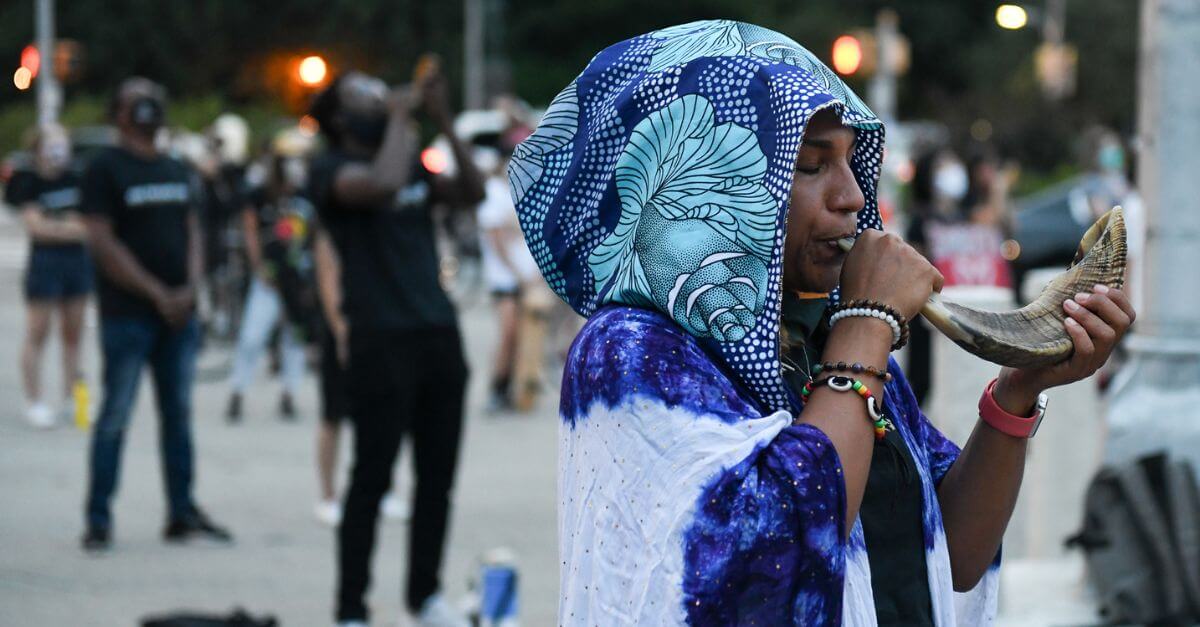Some Black Jews feel more ostracized from Jewish communities post-Oct. 7, survey finds
A survey of Black Jews found increased feelings of alienation related to Israel and Gaza

A Black Jewish Liberation Collective member blows the shofar at a “40 Days of Teshuvah” event in 2020. Courtesy of Autumn Leonard
Growing up as a Black woman in the South with a Jewish father, Autumn Leonard often felt like “an outsider looking in” on Jewish communities. She wasn’t raised particularly Jewish, and her Black and Jewish identities felt disconnected from each other — as if she had to choose one.
But after she married a Jewish man and wanted to raise Jewish children, she sought out ways to engage more deeply with her Jewishness. She found groups that affirmed both of her identities, chairing the “Race Working Group” at the progressive Brooklyn synagogue Kolot Chayeinu and becoming a lead organizer with the Black Jewish Liberation Collective.
“That made me feel like, Oh, Jewish is something I can be — as opposed to something over there that comes from my ancestors,” Leonard said in an interview with the Forward.
After the attacks of Oct. 7, however, Leonard said she began to notice a shift. Jewish communities seemed more inward-looking, she said, with a heightened focus on combating antisemitism and a retreat from commitments to racial justice. She began hearing stories from Black Jews who felt increasingly sidelined or isolated.
So she set out to gather empirical evidence to test her hunch.
The result was a survey conducted through the Black Jewish Liberation Collective, a progressive group that connects Black Jews for political organizing and cultural events. The group circulated the survey beyond its own membership and received 104 responses from a geographically diverse group — most from New York state, but also with respondents in Canada, Portugal and the United Kingdom. Participants were between 21 and 75 years old and reported a range of religious observance levels, from just ethnically Jewish to Orthodox. Responses were collected between October 2024 and January 2025.
The survey — which represents a tiny subset of the estimated 1% of U.S. Jews who identify as Black — found that 62% of respondents reported “increased marginalization” in a Jewish community or space after Oct. 7, 2023.
Those feelings of ostracization largely had to do with disagreements around Israel and Gaza, according to the survey. While survey participants generally identified as more left-leaning on the Israeli-Palestinian conflict, respondents on both sides of the political spectrum said they felt alienated.
In Jewish spaces, some respondents felt they were assumed to be more sympathetic to the Palestinian cause because of their race. Meanwhile, in progressive spaces, some Black Jews felt they were assumed to be Zionist because of their Jewishness.
“I do feel some kind of internalizing shame where I am more careful around the ways that I share my Jewishness in non-Jewish spaces,” one survey respondent wrote. “I resent the ways that Zionism is conflated with Jewishness, and the ways I have to extricate [or] preface that.”
According to Leo Ferguson, a member of the Black Jewish Liberation Collective’s steering committee, another troubling post–Oct. 7 trend is that people who voice criticism of Israel are increasingly labeled “fake Jews.” Black Jews often already face that accusation because of their race — and adding political litmus tests, he said, only intensifies the problem.
“What I have witnessed is more scrutiny of Black Jews. There is an ongoing question as to whether or not we will stand up and be ‘real Jews’ which means aligning with whoever’s politics is judging us,” one survey participant wrote.
Compounding these trends, some Jewish institutions have shifted away from the idea that advocating for a broad range of minority groups also benefits Jews, focusing instead on antisemitism linked to Israel. Just last month, the Anti-Defamation League entirely removed from the “What We Do” page of its website a section called “Protect Civil Rights” amid threats from the Trump administration. Although that change occurred after the survey was conducted, some respondents already saw the trend emerging.
“The way in which much of [the] Jewish community has turned from barely doing antiracism work wholly toward Israel and self-protection is so discouraging, especially as the racism within Jewish community is so severe,” one survey respondent wrote.
The survey offers recommendations based on the survey’s findings, including welcoming ideological diversity in Jewish spaces; having a time and place for Israel discourse, rather than letting it “bleed into all aspects of Jewish life”; and maintaining connections between Black and Jewish advocacy groups even if they disagree on issues surrounding conflict in Gaza.
“The discussion around Israel Palestine has taken up so much of the oxygen that it has made it impossible to then also talk about things like racial justice,” Ferguson said.















